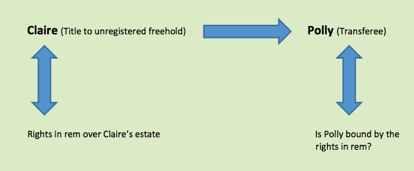Basic Introduction
⇒ As noted before (see here), proprietary rights/interests (i.e. rights in rem) are rights over land which are capable of affecting third parties.
⇒ Here we discuss the circumstances in which a right in rem over an unregistered freehold estate in land will bind a transferee (i.e. a purchaser or donee) of the freehold estate.

The Position Prior to 1st January 1926
⇒ 1) Legal rights in rem (i.e. legal proprietary rights/interest) bind 3rd parties (transferees/purchasers) automatically.
- In other words, if you buy unregistered land you will be automatically bound by the legal rights in rem attached to the land.
- This will materialise even if the transferee (i.e. purchaser) has no notice of the right in rem. In other words, the purchaser of unregistered land will be bound by legal rights in rem over the land even if he/she was not aware of their existence. Although, it is unlikely the purchaser will not be aware of the existence of a legal right in rem as it would most likely be discovered by the transferee's (purchaser's) investigation of title or on physical inspection of the land.
⇒ 2) Equitable rights in rem will also bind all 3rd parties, except Equity's darling.
- The following shows where a transferee would not be Equity's darling(meaning that equitable rights in rem over the land would bind them):
- Where the transferee/purchaser was not bona fide i.e. acted in bad faith.
- Where the transferee/purchaser didn't purchase the estate for value i.e. the land given to him.
- Where the transferee/purchaser does not hold a legal estate in the land i.e. his freehold or leasehold is equitable.
- Where the transferee had notice of the equitable right in rem.
⇒ So we distinguish between legal and equitable rights because before 1926 equitable rights would not bind Equity's darling but legal rights always bind the transferee/purchaser of property.
⇒ Once an equitable right has been defeated by Equity's darling it cannot subsequently survive against someone who isn't Equity's darling (Wilkes v Spooner [1911]).
The Art of Getting a First in Law - ONLY £4.99
FOOL-PROOF methods of obtaining top grades
SECRETS your professors won't tell you and your peers don't know
INSIDER TIPS and tricks so you can spend less time studying and land the perfect job
We work really hard to provide you with incredible law notes for free...
The proceeds of this eBook helps us to run the site and keep the service FREE!

Pre-January 1926: Notice
⇒ Equity's darling often falls on the question of notice (Law of Property Act 1925, section 199(1)(ii)). In other words, whether or not a transferee/purchaser of land is bound by an equitable right in rem will depend on whether or not they had notice of the equitable right in rem. If they did, then they will be bound by the right.
⇒ There are different types of notice:
- Actual notice: all matters the purchaser was aware of at the date of purchase.
- Constructive notice: all matters of which he would have been aware had he taken reasonable care to inspect the title deeds.
- Imputed notice: matters within the actual or constructive knowledge of his agents (e.g. the purchaser’s solicitor).
⇒ The issue was that notice was an uncertain doctrine: the equitable owner could do little to ensure their right survives because often they do not know the land is being sold and it is difficult to assess whether the purchaser ought to have known about the existence of the right through constructive notice. The introduction of the Law of Property Act 1925 partly dealt with this issue...
The Position from 1st January 1926
⇒ 1) Legal rights in rem (i.e. legal proprietary rights/interest) still bind 3rd parties (transferees/purchasers) automatically.
⇒ 2) The effect of an equitable rights in rem changed to reduce the influence of the doctrine of notice (which was too uncertain) through two devices:
- A scheme of 'land charges registration' (Land Charges Act 1925 and codified by the Land Charges Act 1972) (see here).
- The doctrine of statutory overreaching (see here).
*Exam tip*
⇒ Make sure your are clear on the circumstances where legal and equitable rights in rem bind the transferee of property.
⇒ Some other helpful legal resources on rights in unregistered land:
Law Application Masterclass - ONLY £9.99
Learn how to effortlessly land vacation schemes, training contracts, and pupillages by making your law applications awesome. This eBook is constructed by lawyers and recruiters from the world's leading law firms and barristers' chambers.
✅ 60+ page eBook
✅ Research Methods, Success Secrets, Tips, Tricks, and more!
✅ Help keep Digestible Notes FREE

